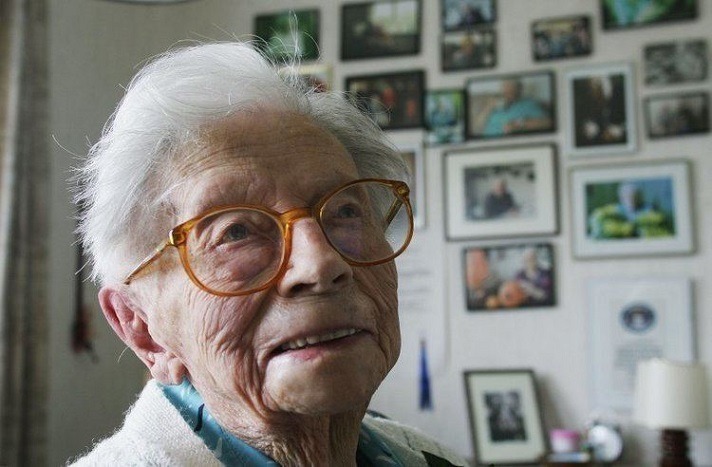Study with 330 centenarians finds that cognitive decline is not inevitable

Hendrikje van Andel Schipper (1890–2005)
Age-Related Cognitive Decline May Not Be Inevitable (WebMD):
It is often assumed that a decrease in memory and brain function are inevitable parts of aging, but a new study of centenarians suggests otherwise.
Investigators found that despite the presence of neurological issues generally associated with Alzheimer’s disease (AD), many centenarians maintained high levels of cognitive performance.
(Henne Holstege, PhD, assistant professor at Amsterdam University Medical Center) said her interest in researching aging and cognitive health was inspired by the “fascinating” story of Hendrikje van Andel Schipper, who died at age 115 in 2005 “completely cognitively healthy.” Her mother, who died at age 100, was also cognitively intact at the end of her life.
“I wanted to know how it is possible that some people can completely escape all aspects of cognitive decline while reaching extreme ages,” Holstege said…
Despite findings of neuropathologic “hallmarks” of Alzheimer’s in the brains of the centenarians after their deaths, the markers were not associated with cognitive performance or rate of decline … “Our findings suggest that after reaching age 100 years, cognitive performance remains relatively stable during ensuing years. Therefore, these centenarians might be resilient or resistant against different risk factors of cognitive decline,” the authors write. They also speculate that resilience may be attributable to greater cognitive reserve.
The Study:
- Question: Are cognitively healthy centenarians resilient against further cognitive decline?
- Findings: In this cohort study of 330 self-reported cognitively healthy centenarians, cognitive trajectories revealed only a slight decline in memory functioning, while other domains remained stable over time. Centenarians maintained high levels of cognitive performance despite being exposed to varying levels of risk factors of cognitive decline, including postmortem Alzheimer disease–associated neuropathologies.
- Meaning: These findings indicate that prolonged maintenance of cognitive functioning may be supported by mechanisms underlying resilience against risk factors of cognitive decline.
Cognitive Trajectories and Resilience in Centenarians—Findings From the 100-Plus Study (accompanying editorial):
- It is difficult enough to recruit and enroll 330 centenarians, but to then have neuropathological findings from 44 study participants who had timely neuropsychological assessments makes for a truly unique study. It is also notable that the neuropsychological assessments in the 100-plus Study were comprehensive, which is not the case for other studies of extremely old study participants that may rely only on a Mini-Mental Status Examination. Cognitive and brain resilience are defined respectively by level of cognitive function and brain tissue structural integrity in spite of a high degree of AD pathological burden. Rather than being resilient, individuals who live to age 100 years or more who do not have AD neuropathologic changes are considered resistant to AD. By integrating neuropsychological assessments and neuropathological studies, subsets of centenarian cognitive superagers and offspring who are either resistant or resilient to AD neuropathologic changes can be identified.


